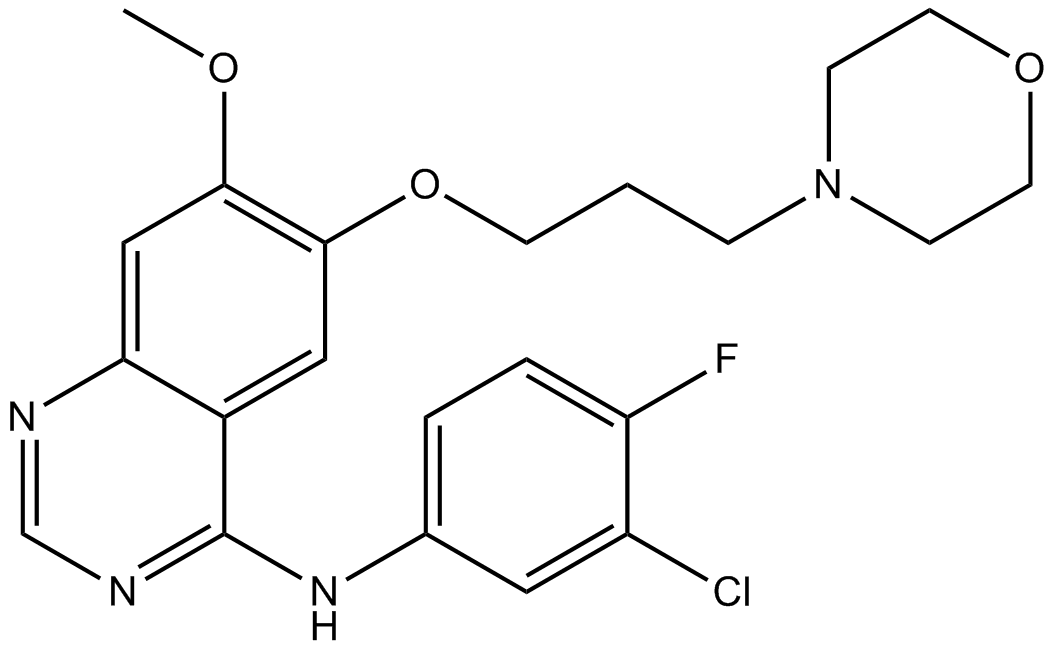Gefitinib (ZD1839) (Synonyms: ZD1839) |
| Catalog No.GC16737 |
Gefitinib (ZD1839), is a potent EGFR-TKI (EGFR tyrosine kinase inhibitor)
Products are for research use only. Not for human use. We do not sell to patients.

Cas No.: 184475-35-2
Sample solution is provided at 25 µL, 10mM.
Gefitinib (ZD1839), is a potent EGFR-TKI (EGFR tyrosine kinase inhibitor) with IC50 of 0.033 µM, selectively inhibits EGF-stimulated tumor cell growth with IC50 of 0.054 µM and that blocks EGF-stimulated EGFR (epidermal growth factor receptor) autophosphorylation in tumor cells[1].
In vitro, the NR6wtEGFR and NR6M cell lines had low levels of PLC-γ phosphorylations but the level in the NR6M cell line was more resistant to inhibition by gefitinib (IC50 of 43 and 369 nm, respectively)[2]. A gefitinib concentration above 0.1 µm decreases the colony-forming ability of NR6W and NR6wtEGFR cells and a concentration of 1.5 µm completely abolishes the ability of these cell lines to form colonies[2]. The IC50 values of four NSCLC cells for gefitinib were 18.90 µmol/L, 16.40 µmol/L, 1.794 µmol/L and 15.99 µmol/L for A549, H1975, PC9, and PC9/GR, respectively[3]. In addition, a small concentration of gefitinib (0.62 µmol/L) significantly inhibited IL-13-induced M2-like polarization of macrophages[4].
In vivo, C57BL/6 mice were treated with 20, 40 and 80 mg/kg, once-daily for 18 days, intragastrically significantly inhibited lung metastases compared with lung tumor metastatic model mice, further indicating that the lung tissue had a reduced number of metastatic lesions and cancer cells[5]. In vivo, the growth of D341 and Daoy (medulloblastoma cell lines) xenografts treated with gefitinib at 150 mg/kg per day was inhibited by approximately 50%. Ectopically overexpressed HER2 in Daoy cells significantly increased sensitivity to gefitinib's antitumor effects in vivo (tumor volume inhibition = 78%)[6].
Wakeling AE, et al. ZD1839 (Iressa): an orally active inhibitor of epidermal growth factor signaling with potential for cancer therapy. Cancer Res. 2002 Oct 15;62(20):5749-54.
Pedersen MW, et al. Differential response to gefitinib of cells expressing normal EGFR and the mutant EGFRvIII. Br J Cancer. 2005 Oct 17;93(8):915-23.
Sun C, et al. FGL1 regulates acquired resistance to Gefitinib by inhibiting apoptosis in non-small cell lung cancer. Respir Res. 2020 Aug 10;21(1):210.
Tariq M, et al. Gefitinib inhibits M2-like polarization of tumor-associated macrophages in Lewis lung cancer by targeting the STAT6 signaling pathway. Acta Pharmacol Sin. 2017 Nov;38(11):1501-1511.
Fan Q, et al. Pedunculoside inhibits epithelial-mesenchymal transition and overcomes Gefitinib-resistant non-small cell lung cancer through regulating MAPK and Nrf2 pathways. Phytomedicine. 2023 Jul 25;116:154884.
Meco D, et al. Antitumor effect in medulloblastoma cells by gefitinib: Ectopic HER2 overexpression enhances gefitinib effects in vivo. Neuro Oncol. 2009 Jun;11(3):250-9.
References:
Average Rating: 5 (Based on Reviews and 30 reference(s) in Google Scholar.)
GLPBIO products are for RESEARCH USE ONLY. Please make sure your review or question is research based.
Required fields are marked with *




















